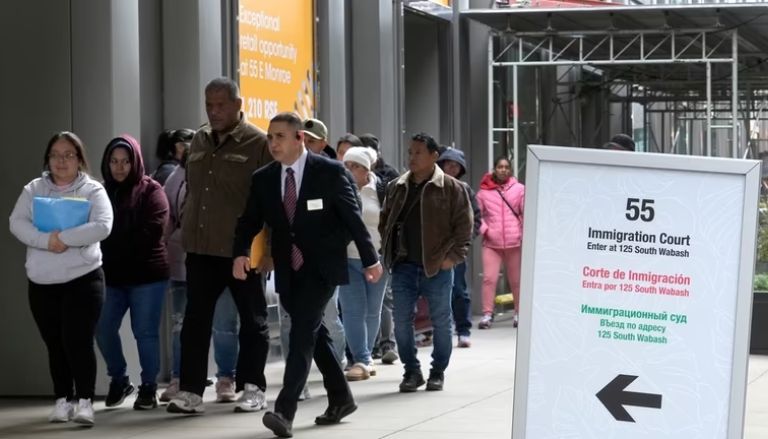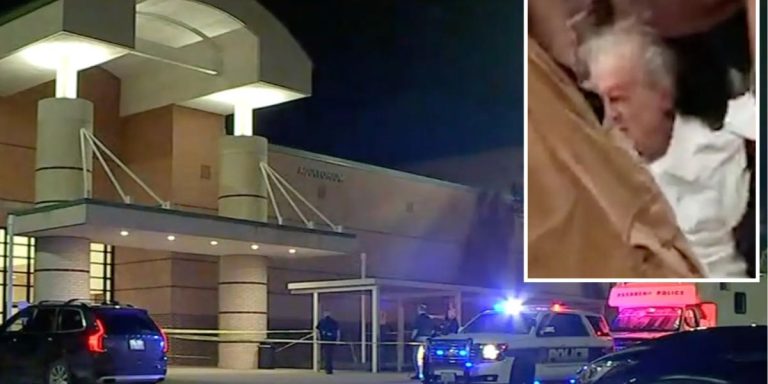A few days after President Donald Trump’s second inauguration, Ruby Robinson went to Detroit’s immigration court to inform people that his organization’s help desk for those facing removal was no longer operating.
The desk run by the Michigan Immigrant Rights Center closed because a Trump executive order caused the Justice Department to tell nonprofit groups to stop working right away on four federally funded programs that helped people involved in immigration cases.
Robinson, the senior attorney for the center, said, “There were people in the waiting room we could have helped, but we can’t do that right now.” He mentioned that the center has assisted around 10,000 people since it started the help desk in December 2021.
Without the programs that teach people in immigration courts and detention centers about their rights and the complicated legal process, many will end up navigating the system on their own. Advocates are concerned that fair treatment in immigration cases and the overloaded immigration courts will be negatively affected as Trump works to fulfill his promise to reduce illegal immigration.
A group of charity organizations that offer services filed a lawsuit on Friday to contest a stop-work order and to quickly regain access to their programs.
Even though they lost federal funds, staff from the Amica Center for Immigrant Rights went to a Virginia detention center to offer services one day after the stop-work order on January 22. They had talked to around 24 people when the holding center staff asked them to leave, saying they could no longer offer those services. Amica’s executive director, Michael Lukens, called this situation “devastating.”
“People often say they don’t know what’s going on.” Why are they being held? What will happen next? Lukens said that we are not allowed to provide even the most basic guidance.
In 2024, lawyers at a help desk in Chicago’s immigration court assisted over 2,000 people. The National Immigrant Justice Center began this project in 2013 with private money and added federal cash three years later.
Since the stop-work order, the group has been offering fewer services, but they don’t know how long they can keep this up due to federal funding cuts, said spokesperson Tara Tidwell Cullen.
Many organizations stated that they were informed that signs about their services and legal help hotlines have been taken down in detention centers.
Congress allocates $29 million a year for the four programs — the Legal Orientation Program, the Immigration Court Helpdesk, the Family Group Legal Orientation and the Counsel for Children Initiative — funding that’s spread among various groups across the country providing the services, Lukens said, adding that the programs have broad bipartisan support. The amount remains the same no matter how many people they help, and the groups usually raise more money to pay for their expenses, he said.
Trump focused on these projects during his first term, but now the situation is different.
In 2018, Attorney General Jeff Sessions said that funding for certain programs would be stopped. However, a group of organizations that offer these services threatened to take legal action, and there was support from both political parties in Congress, which led the Justice Department to change its decision.
This time, the stop-work order was given very suddenly, just a few hours before it started. Program staff were not allowed in the holding centers.
Immigration law is very complex. Unlike in criminal cases, people cannot get a free lawyer if they can’t afford one. Many have to navigate the system without a lawyer.
Immigration courts across the country have a huge backlog of around 3.7 million cases, causing people to wait in uncertainty for years. When people know what to expect and have their affairs in order, hearings move more quickly because judges don’t have to explain the basics to each person who appears before them, advocates claim. It can also lower the number of people waiting at immigration court filing windows because they understand which forms to fill out and can get help with them.
People can choose to continue with their case, understanding the risks and chances of success, or they might decide not to pursue it if they don’t want to deal with a court fight or feel there isn’t a solution for them. This is what Edna Yang, co-executive director of American Gateways, said about their work in Texas.
Yang said that stopping tools that help people find the information they need won’t solve the problem. “It will only make things worse.”
The groups ensure that people’s legal rights are protected, remind them about important deadlines, provide translators, and work to prevent deportation orders that could send asylum seekers back to danger, according to advocates.
Milagro, a 69-year-old woman from Venezuela, came to the U.S. in May 2024 after she made an appointment using a U.S. government app. Before that, she had lived in Mexico for four years. The Associated Press decided not to use her last name because she is worried that coming out might impact her ongoing case.
She applied for asylum because she is afraid for her life in Venezuela due to her resistance to the government. When she arrived, she didn’t have a job and went to the help desk run by Estrella del Paso at the immigration court in El Paso, Texas, to get assistance with her refugee application. The last time she went, she found out it was closed due to a work stoppage.
“You feel frustrated because you can no longer ask for advice,” she said in Spanish. “It’s a feeling of being powerless and alone.”
She said, “Without their help, I would have had to spend money I don’t have.”
With a court date in February, she worries that she will need to spend most of her paycheck from caring for a 100-year-old woman to hire someone to assist her.







Leave a Comment